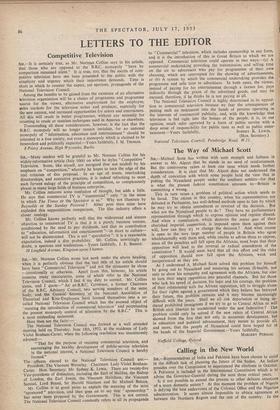Sul,—Mr. Norman Collins wrote last week under the above heading,
when it is perfectly obvious that the real title of his article should have been Commercial Television " and not the misnomer he chose —intentionally or otherwise. Apart from this, however, his article contains many inaccuracies, some of which refer to the National Television Council, which I feel it my duty to correct. Mr. Collins states, and I quote—" An ex-B.B.C. Governor, a former Chairman of the B.B.C. Advisory Council, two serving members of the same body, and the General Secretary of the National Association of Theatrical and Kine-Employees have formed themselves into a so- called National Television Council which has the avowed object of • resisting the introduction of commercial television' and perpetuating the present monopoly control of television by the B.B.C." This is a most misleading statement.
Here then are the facts:—
The National Television Council was formed at a well attended meeting held on Thursday, June 18th, 1953, at the residence of Lady Violet Bonham-Carter, when the following resolution was unanimously adopted:—
"That for the purpose of resisting commercial television, and encouraging the healthy development of public-service television in the national interest, a National Television Council is hereby formed."
The officers elected to the National Television Council are:—
President: The Viscount Waverley. Chairman: Lady Violet Bonham- Carter. Hon. Secretary: Mr. Sydney K. Lewis. There are twenty-five Vice-presidents of distinction, including the Earl of Halifax, the Bishop of London, the Earl Jowitt, the Viscount Hailsham, the Viscount Samuel, Lord Brand, Sir Harold Nicolson and Sir Michael Balcon.
Mr. Collins is at great pains to explain the meaning of the term "sponsored " television, and then goes on to say that " sponsorship " has never been proposed by the Government. This is not correct. The National Television Council constantly refers in all its propaganda to " Commercial " television, which includes sponsorship in any form, and it is the introduction of this in Great Britain to which we are opposed. Commercial television could operate in two ways:—(a) A commercial undertaking providing the transmission, and selling time on the air to advertisers who pay for programmes of their own choosing, which are interrupted for the showing of advertisements, or (b) A system by which the commercial undertaking provides the programme and sells time to advertisers. In both cases, the viewer, instead of paying for his entertainment through a licence fee, pays indirectly through the prices of the advertised goods, and may be excused, therefore, if he thinks he is not paying at all.
The National Television Council is highly determined in its opposi- tion to commercial television because we fear the consequences of putting such an instrument into the hands of persons operating in the interests of commercial publicity, and, with the knowledge that television is fed right into the homes of the people, it is, in our opinion, much safer operated by a form of public service with a deep sense of responsibility for public taste as well as public enter- (Hon. Secretary.) National Television Council, Pembridge Road, W.11.


























 Previous page
Previous page